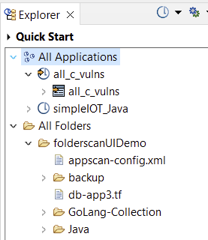Explorer view
Use the Explorer view to view heirarchies of applications and folders in your projects, to start new projects, and to access tools for working with your projects.
- The first tree shows the heirarchy of applications (applications, projects, directories, and project files) with All Applications as the root.
- The second tree show the heirarchy of folders (folders, sub-folders and files) with All Folders as the root.
- General information
- Quick Start section
- Toolbar buttons
- Right-click menu options
- Application and project indicators
General information


In the Explorer view, you add applications and projects and scan code using toolbar buttons, links in the Quick Start section, or right-click menu commands in the explorer section. Once you have added applications, the explorer section provides visual indicators of your applications and projects and the status of each.
Quick Start section
The Quick Start section offers these links for launching common tasks:
- Discover applications: This launches the Application Discovery Assistant, which allows to you to quickly create and configure applications and projects for Java™ and Microsoft™ Visual Studio source code.
- Open an application: This launches an Open dialog box, which allows you to browse for and add an existing application to the set of applications. File or directory types that can be added include .paf, .sln, .dsw, and .ewf.
- Import an Eclipse-based workspace: This launches the Add Workspace dialog box, which
allows you to add an existing Eclipse workspace that contains Java™ projects. After the workspace has been imported, you will be
able to scan any Java™ projects that it
contains.Note: Before importing a workspace, be certain that you have installed and updated the development environment as described in Configuring your development environment for Eclipse projects.
- Import from an application server: Import an existing Java™ applications from an Apache Tomcat or WebSphere® Application Server Liberty application server.
- Open an assessment: This launches an Open dialog box, which allows you to browse for an AppScan® Source assessment file. File types that can be opened include .ozasmt and .xml.
Toolbar buttons
| Action | Icon | Description |
|---|---|---|
| Add Application Menu |  |
Clicking the down-arrow on the Add Application Menu button allows you to select actions for creating a new application, opening an existing application, importing a workspace, or launching the Application Discovery Assistant. |
| Scan Selection |  |
The Scan Selection button allows you to scan the object that is selected in the explorer section. The default scan configuration will be used for the scan. To choose a different scan configuration to use for the scan, click the down-arrow on the Scan Selection button. Select the scan configuration that you want to use - or choose the Edit Configurations action to set a different scan configuration as default (in the Scan Configuration view, select the configuration that you want to set as default, and then click Select as Default). |
| View Menu | The View Menu button opens a menu that allows you to refresh the explorer section and hide registered items. |
Application and project indicators
This table identifies the application and project icons in the Explorer view.
| Application or project type | Not registered | Registered | Missing/Not Found |
|---|---|---|---|
| Imported application |  |
 |
 |
| Application that is created manually or created using the Application Discovery Assistant |  |
 |
 |
| Imported project |  |
 |
 |
| Project that is created manually or created using the Application Discovery Assistant |  |
 |
 |
The Explorer view displays local applications and projects as well as those registered on the server (those that are registered on the server but not saved locally - for example, applications and projects registered by other users - appear grayed out). If you click the toolbar View Menu button and toggle the Hide items registered on the server menu item so it is not selected, you can view existing server applications and projects. If a project is greed out, you can right-click and choose Locate in the menu.